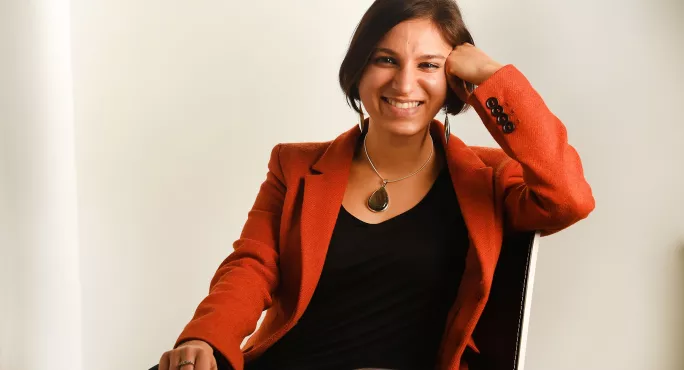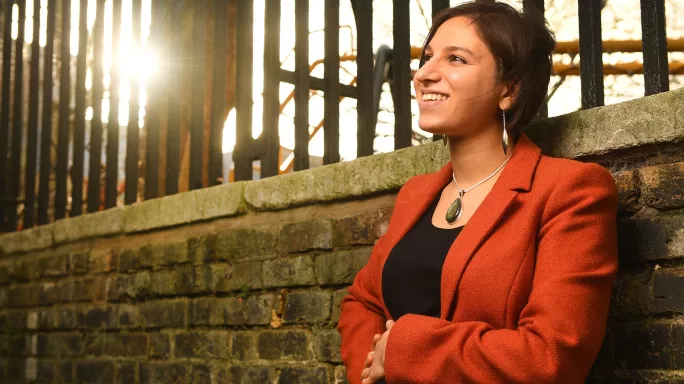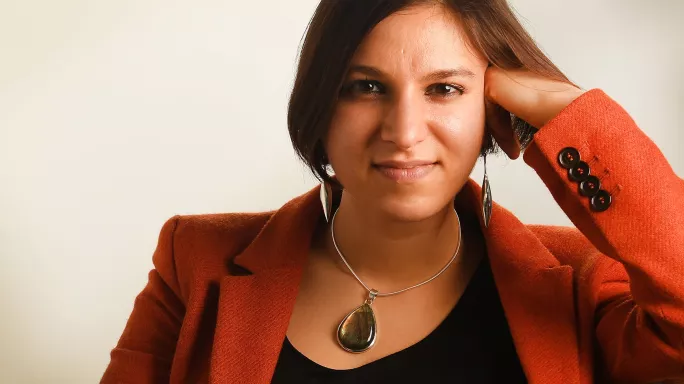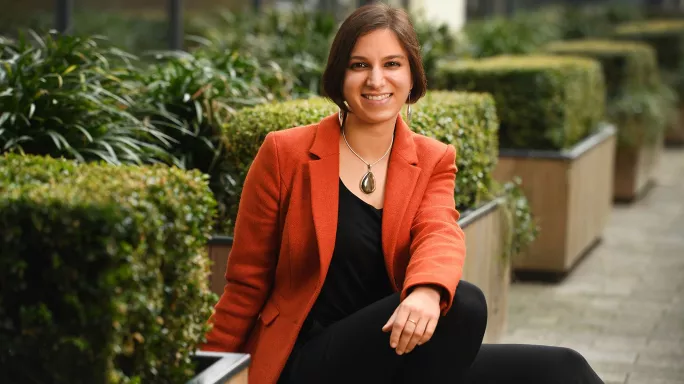- Home
- Meet the woman making ‘The Difference’ for vulnerable pupils
Meet the woman making ‘The Difference’ for vulnerable pupils

Kiran Gill has spent much of her life trying to make a difference to disadvantaged children, from teaching English in inner-city schools to working with the Social Mobility Commission.
Since 2017 she has focused her efforts on setting up The Difference: a programme offering school leaders two years of training in pupil mental health and aimed at stopping the rising tide of exclusions.
Next year it will start placing the first recruits in senior leadership posts in alternative provision (AP) schools to gain specialist training, before eventually moving them back into mainstream education to share their expertise.
Sitting in a café after a day of meetings in Westminster, Gill explains how she wants to turn working with excluded children into the “brain surgery of teaching”.
“We’re looking for pioneers who want to pioneer a new evidence base, learn from the best and try to replicate it and prove that it can have an impact for lots of different pupils,” she says.
“We need more brilliant people to see it as the pinnacle of the profession because here you’re not just teaching. You have to think really carefully and critically about what you’re teaching and why you’re teaching it... [because you’re working] with pupils who are interacting with social services, have mental health problems and are vulnerable to unemployment.
“The Difference is not about taking people out of the system, it’s about providing teachers who care most about the vulnerable pupils with the CPD they need to stay in the profession. And about breaking down the boundaries between the mainstream and AP parts of the teaching profession, so that they respect and learn from each other’s expertise.”
Rising exclusions
Exclusions rates have been rising since 2012 and have accelerated during the years of austerity. Every single day in 2016-17, more than 40 students were excluded permanently from school and around 2,000 for a fixed term, according to official statistics.

Unsurprisingly, excluded pupils struggle with attainment, which can have a lasting impact on their lives. Less than 2 per cent get the five good GCSEs required by most employers, making it much harder to find work.
The challenges in alternative provision
Although only a small minority of pupils are excluded, they make up the majority of the prison population. Each cohort of children removed from mainstream schools costs the state an estimated £2.9 billion in education, health, benefits and justice.
Despite the stark figures, AP schools still struggle to gain recognition. Children in AP are twice as likely to have an unqualified or temporary teacher as in mainstream schools, while vacancies for senior posts doubled between 2011 and 2016.
Gill says not enough work has been done on how to help the rising number of children who are coping with trauma, increasingly complex mental health issues and highly unstable homes.
She saw this first-hand as an English teacher in Bethnal Green Academy and King Solomon Academy, both in London, where she was frustrated by the students who left school still struggling with literacy.
“Both of those schools are doing fantastic things involving great opportunities with pupils. But there was a minority who you thought, ‘Oh gosh, you’ve come to us really vulnerable and you’re leaving really vulnerable,’” she says.
“Over the last few years we’ve focused so much on what works in the education system in terms of typical teaching and learning for the average child, but we haven’t spent enough time developing an understanding of what works with the most vulnerable children.
“We haven’t spent enough time asking: how do you really break the cycle of disadvantage and improve social mobility? If the challenges that are stopping a child in getting where they need to be are actually outside the school, what can schools do?”
Following in her mother’s footsteps
Gill’s commitment to helping children from difficult backgrounds stems from her own family. Until age 11 she grew up as the only daughter of a single mother who worked in difficult schools. Then, when her mum Dawn was 50, she decided to adopt two young girls from foster care.
Living with her sisters, who were 2 and 4 when they became part of the family, Gill saw first-hand how early trauma can affect a child’s ability to trust people, or prompt extreme reactions to small comments that can seem incomprehensible to others.
“Because my degree had included child psychology - and also because I’d grown up with [my sisters] - I knew what the implications were from their behaviour,” she says.

“I was really surprised that some of my colleagues, or teachers that I met, didn’t necessarily have any insight into that kind of stuff. It’s so bizarre we work with children and we’re not trained in child psychology.
“If you come from quite a secure background yourself, or you haven’t reflected on how trauma has affected you, then it’s just not necessarily something you would know anything about.”
The link between Gill’s family and her work on The Difference has become even more pronounced as she has struggled to set up the programme while coping with her mother’s death from cancer.
“This year has sometimes been incredibly hard. It’s taken a lot of energy and optimism and effort and hard work to set something up and that can be really difficult when you’re also grieving,” she says.
“Although I’ve found it hard setting up this organisation while I’ve also been grieving, I’ve had brilliant people around me who have looked after me. And that’s what The Difference is all about: it’s about not making excuses or having low expectations for vulnerable children, it’s about supporting those young people in what is often the most difficult time in their lives and through that support, seeing them do incredible things.”
Inspiring stories
She says she has drawn strength from the inspiring young people she has met who have managed to overcome incredibly difficult circumstances - and the teachers who support them.
She describes one young woman who ended up in jail during her A-level years after being coerced into committing a crime while living on the streets. Her school never gave up on her, however: teachers brought her homework to do in her cell and her head fought hard to help overturn her conviction, and she was able to return to study. Not only did she pass her A levels but is now applying to university.
Another young man was repeatedly thrown out of school after his behaviour became challenging following the death of his father. This year, through the support of fantastic teachers, he was nominated for Young Builder of the Year Award at the House of Lords.

Gill says The Difference is aimed at teachers like that head who are prepared to think beyond the boundaries of school to help their students.
The programme is currently looking for its first team of recruits and is organising a conference in January called IncludEd to help drum up interest and spread best practice.
The Difference is focused on training senior leaders because, as Gill puts it, “it’s leaders who lead positive change” and who can make the most difference in changing lives.
“If a school leader arrives in a school as a head and sets the culture, it can radically change how all children, parents and staff feel,” she says.
“We’re not just recruiting more brilliant people to work in those schools. We’re asking a really elite cohort of really exceptional teachers to go into those schools and work alongside colleagues, learn from them, but also then to take that learning back into mainstream to support those learners who might have undisclosed traumas, support other teachers, and - ultimately - reduce the likelihood of school exclusion.”
The Difference runs a programme which develops leaders through a two-year leadership placement in a PRU; Vicky will be telling her story at the IncludED conference 2019, in partnership with Tes. Tickets available now.
Kiran Gill CV
Jan 2017-present: The Difference, founder
Jan 2017-present: The Institute for Public Policy Research, associate fellow
2016: Social Mobility Commission, head of policy vocational and higher education
2015-present: Freelancer for Isos Partnership, Education Development Trust, Save the Children, policy consultant
2014-15: Teach First, policy adviser
2014: Department for Education, Teach First policy consultant
2013-14: King Solomon’s Academy, deputy head of English
2010-13: Bethnal Green Academy, whole school literacy leader; English teacher
Keep reading for just £1 per month
You've reached your limit of free articles this month. Subscribe for £1 per month for three months and get:
- Unlimited access to all Tes magazine content
- Exclusive subscriber-only stories
- Award-winning email newsletters



